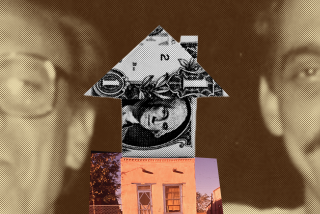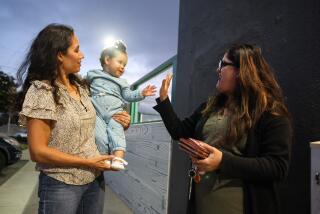Immigration Was the Best Medicine for This Family
- Share via
On the Philippine island of Mindanao, Antonio Lim’s children often walked from their home to their father’s medical clinic below to watch him operate.
Because they did, there is usually a doctor in the house during family gatherings at Antonio and Paz Lim’s new San Dimas home.
In fact, meetings of the Lim clan may include four doctors, a medical student and, in case anyone develops a toothache, a dentist.
All told, five of the Lims’ seven children went into medicine or dentistry before or after the family immigrated to the United States in 1970.
Today, Tony, 47, and Andrew, 32, practice family medicine in Albany, Mo., and Rochester, N.Y. James, 30, trains as a radiology resident in Oklahoma City, while Michael, 26, studies at Baylor University medical school in Houston.
Meanwhile, John, 34, is polishing a career as a dentist in Albuquerque, N.M.
While the men studied medicine, the female members of the family entered other fields.
Perlita Uyboco, 42, a former vocalist with the Roger Wagner Chorale, travels four months a year singing sacred music, while Emma Kwong, 25, recently graduated from San Diego State with a degree in business.
“I think the early exposure to medicine in my clinic influenced the boys,” said Lim. Slight at 5 feet, 6 inches, 72-year-old Lim is retired from his ear, eye, nose and throat practice.
“And I can say that my husband had a very successful practice,” said Paz Lim, 67, seated near her husband at the dining table in their three-bedroom home. “It became more attractive to the children.”
“And remember that they lost a son,” said their daughter, Perlita, during a visit to her parents, recalling her 8-year-old brother who died from heart failure. “I know the incident spurred my older brother. My brother saw him suffer, and that inspired him to become a doctor.”
Aside from the tragedy of their brother’s death, the Lim children have memories of a comfortable life on Mindanao. They lived in a five-bedroom home with a big dining room, living room, balcony and extended kitchen.
While Antonio Lim sometimes accepted only a chicken or eggs as payment from patients, Paz Lim bought and sold real estate and ran three coconut farms totaling 300 acres.
She had a driver and four live-in maids.
“It was fun to work there,” she said. “There were so many good people needing jobs that labor is no problem.”
When the Lims moved to the United States, however, they surrendered most of their property under a Philippine law prohibiting the transfer of funds to another country.
They said they took such a drastic step because their children reached college age while the Philippine educational system disintegrated under the Marcos government.
“At the universities,” Paz Lim said, “the students spent two days a week in the streets rioting and demonstrating and three days in school. . . . And I said, ‘It’s time for us to think fast (about leaving).’ ”
She said it was hard for her husband to leave his practice for a new nation where he would work for someone else.
“And I told him that if it’s hard for you, it’s hard for me. Coming here I’m reduced to wearing an apron. I take care of the kids. I do all the hair cutting, the laundry, the house scrubbing.
“I had to make a choice whether it’s family or money,” she said. “Because if I neglect the children now, all the money we leave them later will do no good.
“We wanted them to have the best education possible. . . . Our lives are God-given. We all have the potential to do well, but we have to develop (our talent) . . . to be what we should be.”
Antonio Lim took three years to agree to the move, and said that when he arrived at age 55, he could not get an internship in his specialty or start his own practice. Instead he worked at the Wadsworth Veterans Administration Medical Center in West Los Angeles.
“After I adjusted,” he said, “I enjoyed my work.”
But his wife got sick. Caring for her children exhausted Paz Lim.
“I had severe chest pains and my husband thought I had a heart attack,” she said. “I didn’t eat right and I didn’t have enough rest and I had an upset stomach all the time.” She also developed gallstones, which required surgery.
Paz Lim recovered and followed her husband in 1973 to Winnebago, Neb., where he directed medical services for the Winnebago Indian reservation, and in 1976 to a similar position at the Mescalero Public Health Hospital on the Apache reservation in Mescalero, N.M.
He retired in 1979.
“I still wanted to work,” he said, “but they wanted younger doctors.”
The couple moved to El Cajon to be near their daughter Emma. When she moved away, they bought a home in San Dimas, close to their daughter Perlita.
They feel settled now, and in a large backyard near the San Gabriel Mountains recently, the Lims reflected on an odyssey to the United States that began two years before then-President Ferdinand Marcos imposed martial law in 1972 in the Philippines.
“We did not know what he was doing,” Paz Lim said.
“We thought he was doing his best. It’s so hard to believe what we hear about him now. Because he’s a very intelligent person.”
The Philippines seemed far away as Paz Lim, the family gardener, said she bought the one-third-acre property as soon as she saw it.
“It’s semi-country,” she said as a quiet, gentle breeze blew across a nearby canyon, disturbed only by the soft hum of Interstate 210 a quarter-mile north.
“We like it here.”
More to Read
Sign up for Essential California
The most important California stories and recommendations in your inbox every morning.
You may occasionally receive promotional content from the Los Angeles Times.










